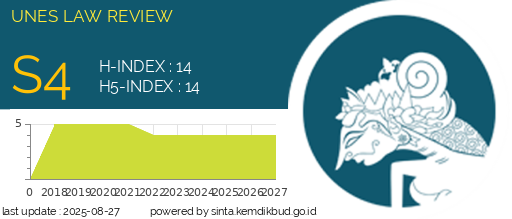Problematika Surat Perintah Penghentian Penyidikan (SP3) Oleh Komisi Pemberantasan Korupsi (KPK) Dalam Tindak Pidana Korupsi di Tinjau Dari Perspektif Keadilan Berdasarkan Pasal 40 Ayat 1 Undang – Undang Komisi Pemberantasan Tindak Pidana Korupsi
DOI:
https://doi.org/10.31933/unesrev.v7i1.2281Keywords:
SP3, KPK, Corruption Crime, Justice, Normative LawAbstract
This research discusses the issue of the issuance of an Order to Terminate Investigation (SP3) by the Corruption Eradication Commission (KPK) in corruption cases. The main focus lies on the effect of the application of Article 40 paragraph (1) of the KPK Law which authorizes SP3, as well as its impact on justice and legal integrity. On the one hand, the SP3 authority is considered to provide legal certainty for suspects, but on the other hand, it triggers concerns regarding the potential for abuse of authority and negotiation practices that harm substantive justice. This research uses a normative legal approach by analyzing laws and regulations and court decisions. The results show that the issuance of SP3 by the KPK has the potential to harm the principle of justice, especially in corruption cases involving officials with broad access to power. Therefore, it is important to ensure that the application of SP3 authority is carried out carefully and transparently so as not to damage the integrity of the legal system and public trust.
Downloads
References
Abdullah, A. F. (2019). BLAMBANGAN PEOPLE’S RESISTANCE TO VOC YEAR 1767-1773. Santhet (Jurnal Sejarah Pendidikan Dan Humaniora), 3(2), 46–55.
Asshiddiqie, J. (2005). Hukum tata negara dan pilar-pilar demokrasi.
Fuady, M. (2007). Dinamika teori hukum.
Kertonegoro, S. (1987). Jaminan Sosial: Prinsip dan Pelaksanaannya di Indonesia. Mutiara Sumber Widya.
Mochtar, M. A. (2009). Pembalikan beban pembuktian tindak pidana korupsi. Sekretariat Jenderal dan Kepaniteraan, Mahkamah Konstitusi.
Palimanan, Y. (2009). MAJAPAHIT (cet. 1). Indahjaya Adipratama.
Poggi, G. (1978). The development of the modern state: A sociological introduction. Stanford University Press.
Rahardjo, S. (1991). Ilmu hukum. Citra Aditya Bakti.
Soekanto, S. (2011). Faktor-faktor yang mempengaruhi penegakan hukum.
Sumaryanto, A. D. (2009). Pembalikan beban pembuktian: tindak pidana korupsi dalam rangka pengembalian kerugian keuangan negara. Prestasi Pustaka Publisher.
Susanto, A. F. (2019). Filsafat dan Teori Hukum Dinamika Tafsir Pemikiran Hukum di Indonesia. Prenada Media.
Tahir, H. (2002). Proses Hukum yang Adil dalam Sistem Peradilan Pidana di Indonesia. UNIVERSITAS AIRLANGGA.
Waluyo, B. (2008). Penelitian hukum dalam praktek.
Yohanes Maharso Joharsoyo. (2024). Polda Metro Jaya Terbitkan Sprindik Baru untuk Kasus Firli Bahuri. Tempo.Com.
Downloads
Published
How to Cite
Issue
Section
License
Hak cipta :
Penulis yang mempublikasikan manuskripnya di jurnal ini menyetujui ketentuan berikut:
- Hak cipta pada setiap artikel adalah milik penulis.
- Penulis mengakui bahwa UNES Law Review berhak menjadi yang pertama menerbitkan dengan lisensi Creative Commons Attribution 4.0 International (Attribution 4.0 International CC BY 4.0) .
- Penulis dapat mengirimkan artikel secara terpisah, mengatur distribusi non-eksklusif manuskrip yang telah diterbitkan dalam jurnal ini ke versi lain (misalnya, dikirim ke repositori institusi penulis, publikasi ke dalam buku, dll.), dengan mengakui bahwa manuskrip telah diterbitkan pertama kali di Jurnal UNES Law Review.



















